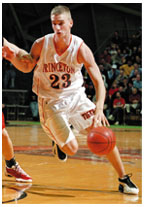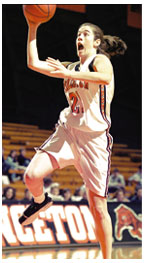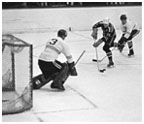February 27, 2002: Sports
Conference
calls
Men fare better than women in early Ivy League play
Laureate
on ice
Former Tiger forward Michael Spence É66 has changed the way people look
at economics
Switching
lanes
MenÉs and womenÉs swimming and diving seasons diverge at Harvard-Yale-Princeton
meet
Sports Web Exclusives! The Varsity Typewriter column
Conference
calls
Men fare better than women in early Ivy League
play
Captions: Mike Bechtold
’02 and the Tigers are tearing through the Ivy League. (photo: Beverly
Schaefer)
Lauren Rigney ’02 is one of five Tigers averaging 9 points or better
per game. (photo: Beverly Schaefer)
The start of the Ivy League season brought very different results for Princeton’s men’s and women’s basketball teams.
While the men’s squad overcame a major injury and a slow start to the season to sit undefeated atop the Ivy League as of February 7, the women’s team appeared to have hit a midseason swoon after losing four straight games, its longest losing streak of the season.
 Men’s
Basketball
Men’s
Basketball
John Thompson ’88’s team swept through its second week of Ivy League play with wins over Columbia on February 1 and Cornell on February 2. That left the Tigers (9—7, 4—0 Ivy) as the only undefeated team in the league.
But Thompson, who has seen many Ivy League seasons play out in their final days in his time as a player and coach, is not about to start making airline reservations for mid-March quite yet.
“We’ve got a long way to go,” said the second-year coach after the Tigers manhandled Cornell at both ends of the court en route to a 60—38 win at home. “I think (the team) understands that every weekend is important. Every game is hard and every game is tough. We can lose to anyone and we can beat anyone.’’
It looked as if Princeton was going to have a tough time in a much-improved Ivy League after starter Andre Logan ’04 went down for the season with a torn anterior cruciate ligament in his left knee during a win over Harvard on January 11. But the Tigers used strong team defense and a balanced scoring attack to string five victories together, including easy wins over Dartmouth and Division III Western Maryland in January.
In the Western Maryland game, Princeton won 78—24, the lowest point total ever allowed in Jadwin Gym’s 33-year history. Against Columbia, the Tigers used a full-court press to force 19 turn-overs and came back from being down by as many as 13 points to win 49—41.
Kyle Wente ’03 had the shooting touch against Columbia, scoring a season-high 17 points while playing a full 40 minutes. “Whatever play we needed, he made it,” said Thompson of Wente.
Princeton did not have to worry about coming back against Cornell the next night, however. A stifling half-court defense coupled with a career night from Ray Robins ’03, who scored 18 points in the first half and finished with 28, let the Tigers roll to what turned into a blowout early.
The only suspense from the outset of the game was whether Cornell would score a field goal. Princeton held the Big Red to 4 points – all on free throws – for the first 12 minutes of the game, building a 32—9 halftime lead.
Robins, who has replaced Logan in the starting lineup, kept the Jadwin crowd roaring all night as he hit on jumpers and drives from every spot on the floor, including five three-pointers and a double-pump dunk on a fast break in the first half.
But the largest cheer from the crowd came after Penn’s 54—53 loss to Columbia was announced over the public address system in the second half. The loss dropped Penn to 2—2 in the Ivies. Four games into conference play, the Ivy League season looked like it would feature several more contenders for the league title if Yale, Brown, and Harvard continue winning.
But the Ivy contenders could be separated from pretenders by mid-February, when the Tigers hit the road to face Yale and Brown on February 8 and 9, respectively, and take on Penn at home on February 12.
 Women’s
Basketball
Women’s
Basketball
The shining start to Princeton’s season lost a little luster after the Tigers dropped four straight games. The losing streak included three Ivy League losses to Dartmouth, Columbia, and Cornell from January 12 to February 2 and dropped Princeton’s record below .500 for the first time this year. The other loss was on the road at Stony Brook.
But this season’s version of the Tigers remains a vast improvement over last year’s 2—25 squad, and their 8—9 record (2—3 in the Ivies) still gives Princeton an outside chance for their first Ivy title since 1998—99, when they shared the regular season title with Dartmouth.
A drop-off in the Tigers’ scoring is the major factor in their
letdown. After averaging nearly 70 points a game for much of the season
thanks to first-year coach Richard Barron’s high-octane approach
on both ends of the court, Princeton averaged 59 points a game during
its losing streak. ![]()
By A.D.
Laureate
on ice
Former Tiger forward Michael Spence ’66 has changed
the way people look at economics
By Jerry Price

 Caption:
Michael Spence ’66 charges a Dartmouth goalie during a 1964 match.
(Princeton Office of Athletic Communications)
Caption:
Michael Spence ’66 charges a Dartmouth goalie during a 1964 match.
(Princeton Office of Athletic Communications)
Caption: Michael Spence ’66 (stanford university)
If I make widgets and sell my widgets to you, where is it written that we both must know exactly the same amount about widgets?
Until Michael Spence ’66 came along, it was written in every economics textbook in classrooms everywhere.
“Economics has always been based on the idea that the buyer and seller know the same amount,” Spence says. “We thought about looking at economics from the point of view that the buyer knows less than the seller.”
A simple enough idea, it changed much of economics, influencing the markets, the sale of all sorts of goods, and public policy.
It has also had an impact on Spence, who last fall was awarded a Nobel prize in economics from the Royal Swedish Academy of Sciences.
Not bad for a philosophy major who would have been playing hockey “somewhere in Siberia” if he’d only been a little better as a schoolboy.
“It’s been unbelievable,” Spence said after returning from Stockholm in mid-December. “There have only been about 750 Nobel Prizes awarded in the 100 years they’ve been given out. Einstein won one. It’s not a bad group to be in. It’s very humbling.”
The Nobel Prize is actually a piece of gold that looks like a diploma. “It’s pretty heavy,” Spence says. “And it comes with a little, tiny pin that all Nobel winners wear to Nobel events.”
A little, tiny pin and a big, big check. Like all Nobel winners, Spence earned $1 million, which he shared with his two cowinners, George Akerlof of the University of California, Berkeley and Joseph Stiglitz of Columbia University.
“We’ll probably give most of the money away,” says Spence, who is a partner in Oak Hill Capital Partners and Oak Hill Venture Partners. “We’re very fortunate to be in a position to do so.”
Spence’s journey to Stockholm began in Montclair, New Jersey, where he was born, and Winnipeg, where he lived until he was five. From there his family moved to Toronto, where he stayed until graduating from high school.
As a boy, he was a very good hockey player, though it was a much different road for the top Canadian players back then.
“You can get to the NHL through college hockey now, but in those days, college hockey was death as far as the pros were concerned,” he says. “You had to do what Bobby Orr did. You had to go to the pro-sponsored junior leagues. If you didn’t make it from there, you played in the senior leagues, which was like playing somewhere in Siberia.”
Spence and a pair of high school classmates decided to come to Princeton to play, and he lettered as forward in his sophomore, junior, and senior years. “A few of my friends were going to Princeton, so I looked into it. Hockey was great there. People came out to watch us. We weren’t as good as they’ve gotten to be, but it was still great,” he reminisces.
After graduation, he went to Oxford as a Rhodes Scholar. Upon returning to the U.S., he earned a doctorate in economics from the Harvard Business School and eventually joined the faculty.
Spence, whose son Graham graduated from Princeton in 2001, served as the dean of the faculty of arts and sciences at Harvard from 1984 until 1990, when he became the dean at the Graduate School of Business at Stanford. He held that position until 1999, and continues to teach at the school.
“I’ve always liked economics because it’s part science and part practical. It keeps you involved in the world around you. It’s hard to be an economist without being interested in the world around you,” he says.
It’s a world that he has personally helped to change, and because of it, his world is changed forever.
“It changes your life,” says Spence of the Nobel. “You
carry the label for the rest of your life. I know I’m the same person
I was before, but this changes your visibility. Maybe your voice is a
little louder, heard a little easier. I guess I’ll find out.”
![]()
Jerry Price is assistant director of athletics.
Men’s and women’s swimming and diving seasons diverge at Harvard-Yale-Princeton meet
 Caption:
Jesse Gage ’03’s second place in the 100-yard men’s butterfly
and two first-place finishes in freestyle were not enough for Princeton
at the H-Y-P meet. (photo: Beverly Schaefer)
Caption:
Jesse Gage ’03’s second place in the 100-yard men’s butterfly
and two first-place finishes in freestyle were not enough for Princeton
at the H-Y-P meet. (photo: Beverly Schaefer)
Seniors on this year’s Princeton women’s swimming and diving team could accomplish something no other class has ever done: win every dual meet of their four-year careers.
The team’s wins over rivals Harvard and Yale at the annual Harvard-Yale-Princeton meet on February 2 and February 3 in New Haven brought the Tigers’ winning streak to 30 straight matches. Their final dual meet was scheduled for February 9 at Columbia.
The Tigers’ (7—0, 6—0 Ivies) undefeated season and No. 23 ranking in the national swimming and diving coaches’ poll made them the favorites heading into the Ivy Championships at Harvard from February 21 to 23.
The men’s team also opened the year undefeated, but did not fare anywhere near as well in New Haven, losing to both Yale and Harvard on the men’s side of the
H-Y-P. A second and a half separated the Tigers from Yale in the 400-yard free relay, and Princeton lost by one point, 177—176. The Tigers fell to Harvard 191—162. Their record now stands at 5—2 overall and 4—2 in conference.
The women’s team was led by strong performances from seniors Valerie Kukla and Kate Conroy. Kukla swam to a six-second win in the 1,000-yard freestyle and also added victories in the 200-yard freestyle and 500-yard freestyle. Conroy, who qualified for the NCAAs last year, won the 100-yard backstroke and the 200-yard backstroke.
Conroy, who leads the team’s 200-meter relay into the water at the start of every dual meet, and Kukla, whose 1,000-yard freestyle event follows the relay, are a 1—2 opening punch that 18-year coach Susan Teeter is sure to miss.
“Their starts have been a huge bonus for us,” said Teeter after the H-Y-P meet.
Senior diver Mary Mulcare described her class’s dual-meet winning streak as “phenomenal” and attributed their success to a team that always pulls together regardless of differences and to swimmers who pull off great swims when the team needs it.
“I never would have expected it,” said Mulcare, thinking back
to her freshman year. “It’s something I feel very lucky to be
a part of.” ![]()
By A.D.
